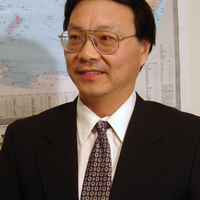Kang Liu
Duke University, Asian and Middle Eastern Studies, Faculty Member
- Professor of Chinese Studies, Duke Universityedit
Research Interests:
Marxist aesthetics has been a central concern in China's cultural scene for much of the twentieth century. Obviously, Mao Zedong's foundational
Research Interests:
The essay takes the Special Issue of Chinese Encounters with Western Theories of Modern Language Quarterly as a case study, reviewing the essays of three Chinese authors Wang Ning, Zhang Jiang, and Zhu Liyuan and commentaries by Theo... more
The essay takes the Special Issue of Chinese Encounters with Western Theories of Modern Language Quarterly as a case study, reviewing the essays of three Chinese authors Wang Ning, Zhang Jiang, and Zhu Liyuan and commentaries by Theo D'haen, Hillis Miller and myself. The essay offers a metacommentary of the essays and commentaries with respect to issues of the academic contexts in which the dialogue in this special issue is conducted, Chinese scholars' anxiety of influence over western theories, the problem of "Dao (principles)" and "Shu (techniques)," and universalism vis-à-vis exceptionalism. This essay argues that the historical facts of modern China, especially the history of reform and opening up of the last four decades, show that China is in the world and the world is in China, and that the relationship of universalism and exceptionalism cannot be viewed as binary oppositions and mutual exclusions. Rather, it is overdetermined by multiple factors of integration and complementarity.
Research Interests:
Research Interests:
Research Interests:
Research Interests: Critical Theory, Cultural Studies, American Studies, Comparative Literature, Philosophy, and 15 moreEducation, Chinese Studies, Ideology, Comparative Cultural Studies, Television, Film and Media Studies, Literary studies, Rhetoric and Composition, Maoism, Social and Behavioral Sciences, Arts and Humanities, Communication and media Studies, Theatre and Performance Studies, Exceptionalism, and Reading and Language
Research Interests:
Research Interests:
Research Interests:
JSTOR is a not-for-profit service that helps scholars, researchers, and students discover, use, and build upon a wide range of content in a trusted digital archive. We use information technology and tools to increase productivity and... more
JSTOR is a not-for-profit service that helps scholars, researchers, and students discover, use, and build upon a wide range of content in a trusted digital archive. We use information technology and tools to increase productivity and facilitate new forms of scholarship. For more information about JSTOR, please contact support@jstor.org.
Chinese Exceptionalism
This essay takes Fredric Jameson and Chinese Jamesonism as a case in point to illustrate the Chinese anxiety of influence with Western theory and the battle between (Western) universalism and Chinese exceptionalism. Chinese Jamesonism... more
This essay takes Fredric Jameson and Chinese Jamesonism as a case in point to illustrate the Chinese anxiety of influence with Western theory and the battle between (Western) universalism and Chinese exceptionalism. Chinese Jamesonism shows how an eclectic American neo-Marxist academic discourse has been invented in China on selected themes of postmod-ernism and Third World "national allegory." However, as a "shadowy but central presence" in Jameson and other Western left theories, Maoism is nearly absent from China's appropriation of Western theories. A vigorous critique of the relationship between Maoism and Western left theories sheds light on the issues of politics and ideology underlying the Chinese anxiety of influence.
Research Interests:
ABSTRACT The dramatic increase in China's economic and hence political power and influence is a common story around the world. Just how clearly and well does this story get across to citizens of some nations other than China,... more
ABSTRACT The dramatic increase in China's economic and hence political power and influence is a common story around the world. Just how clearly and well does this story get across to citizens of some nations other than China, itself? In particular, we ask what Americans know about China. Do they observe its rise? Are their views simple or rich and nuanced? How do they vary across the public? What leads to more positive and what leads to more negative views of China? We report the results of a survey of the American population designed to address these questions. We find that they are reasonably knowledgeable of China's rise and that they have rich and nuanced perceptions of a variety of dimensions of China, its society, economy and polity. These views are, on balance, not especially positive, but the more cosmopolitan the citizen, the more likely they are to hold positive views. Those who are Democrats, who are liberals, and who have had the opportunity to travel in China are especially likely to have positive impressions.
